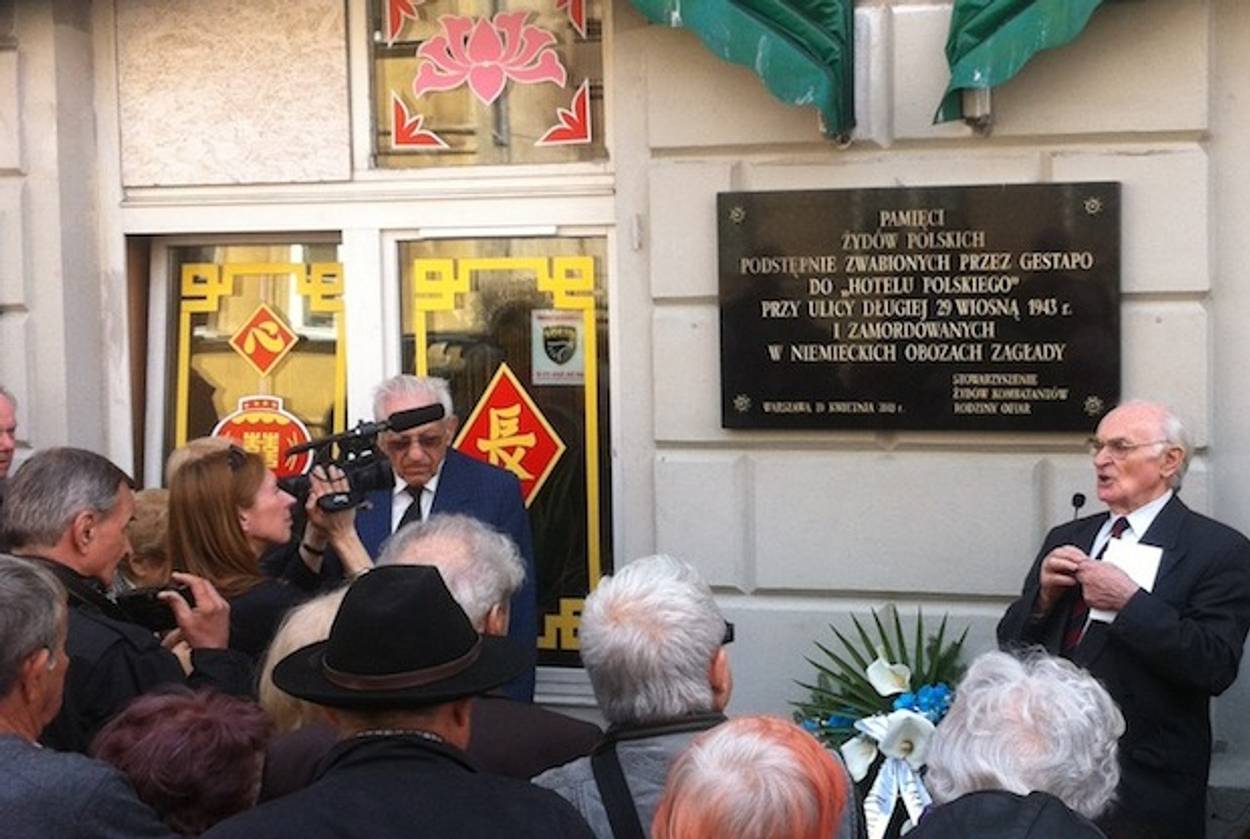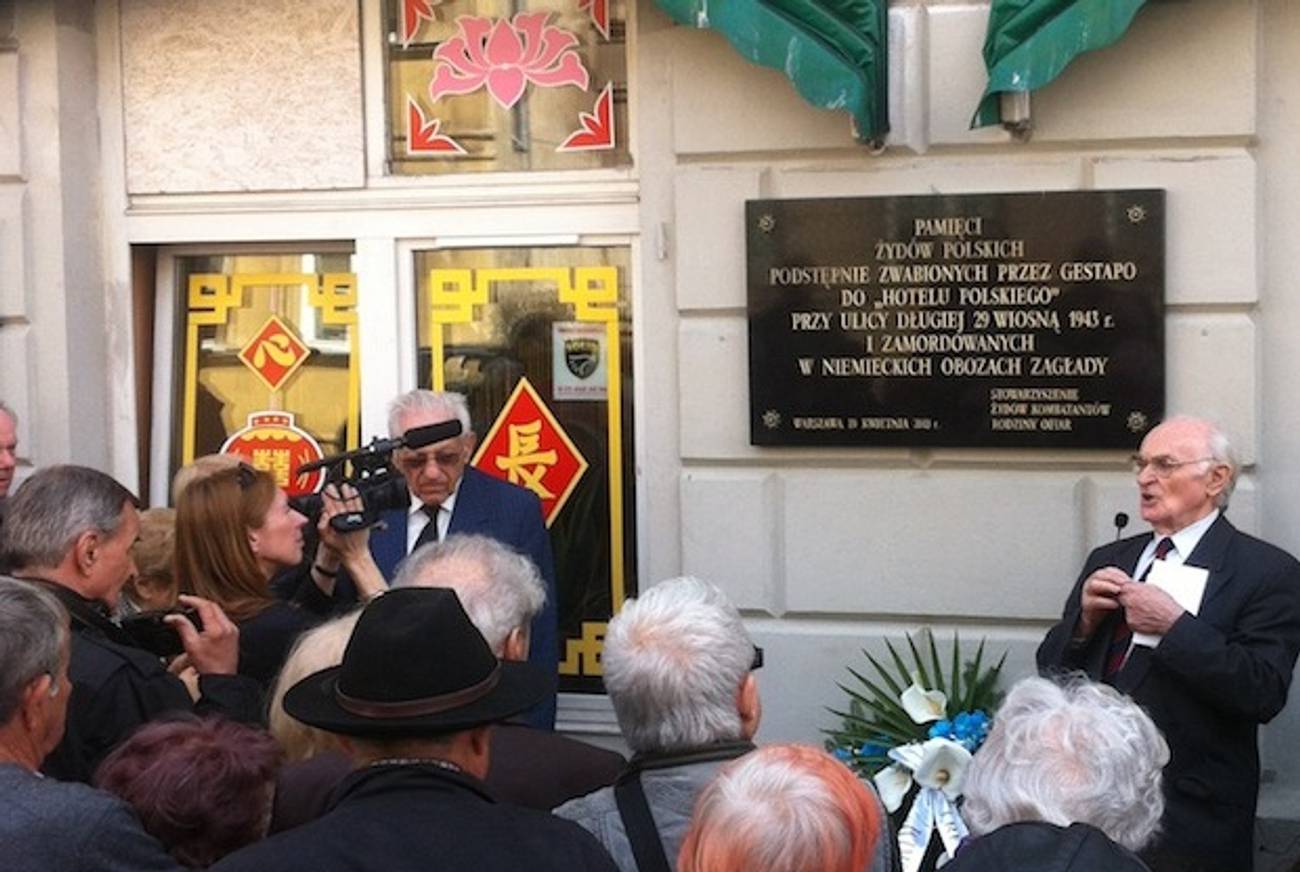Unveiling a Plaque at the Hotel Polski
Warsaw marks a historic venue




The legend of Hotel Polski is one of those stories that you want to believe even if it isn’t true. In each telling a new detail is added, but it goes something like this: A man goes to a wedding in Poland and immediately falls in love with one of the bridesmaids whom he sees from a distance. Following the wedding, he proposes marriage and she turns him down. Undeterred, he stays in touch, sending letters and packages.
But as the specter of Nazi Germany begins to cast a pall over Warsaw, he begins to worry about her safety. He works to arrange passports to be sent to her at the Hotel Polski, which has become a way station for Jewish families wishing to flee Warsaw. With legal passports and citizenship papers obtained illegally from neutral countries (largely South American ones), a few hundred Jews are saved, the woman included, who escapes Warsaw and marries the man. Some claim she is still living, splitting her time between New York and Asia.
***
While a few hundred Jews were saved through the Hotel Polski–sometimes exchanged for German prisoners captured in Palestine and elsewhere–the majority were not so lucky. Having abandoned their hiding places in Warsaw for the hotel, thousands were sent to perish at places like Vittel, Auschwitz, and Bergen-Belsen, after the South American countries refused to honor their documents. In July of 1943, the remaining few hundred were transported to the Pawiak prison where they were all executed.
Earlier today, 50 people gathered outside the Hotel Polski, which sits on a short cobblestone street in Central Warsaw not far from where the old Jewish Ghetto stood, for the unveiling of a plaque marking the historic spot. The ceremony–solemn but with a curious air of distance–was conducted almost entirely in Polish save for the reading of Psalm 130 and the El Malei Rachamim by a local rabbi. The crowd chatter was a mix of Polish, English, and Hebrew, including an impromptu rendition of ‘Hatikvah’ after the event.
The crowd, which skewed older, was a collection of descendants of the survivors, local Warsaw community leaders, a few passersby, Polish men in military regalia, and a guest of honor: Jôsef Atlasowicz, an old occupant of the hotel and a survivor. Trim and dressed in a bright blue blazer, Atlasowicz, delivered a short speech. Watching along were three generations of Atlasowiczes (Atlases), who converged from west (London) and east (Israel) for the occasion.
Atlasowicz lived in the Warsaw Ghetto with his family and, later, in the Hotel Polski with his father. His mother and sister died in Treblinka while he and his father were captured in a round-up at the Polski in July of 1943 and sent to Bergen Belsen. The story would have ended there had Atlasowicz and his father not been carpenters, a trade that spared them from execution. Atlasowicz dug a tunnel out and escaped through the sewers. He eventually emigrated to Israel, where he became an army engineer. At 89, he still works as an engineer and lives outside of Haifa.
“I didn’t want to come back, but I had to,” he told me, jerking his head toward his family. “I wanted to a normal life–I have a normal life. I’m still working.”
Asked of his memories of the hotel, of all things, Atlasowicz mentions a balustrade, which he says is still intact.
The crowd dispersed and the family and I went on a small cafe nearby where apple cake, Coca Cola, coffee, and strudel circulated. The Atlasowicz clan isn’t short on stories. One side of the family passed through the Polski, but didn’t survive the war, another member spoke of being born in Warsaw in 1943 and living as a Gentile before moving to England a few years later. Atlasowicz’s granddaughter, who lives near him in Israel, is preparing for her service in the IDF.
The snacks long finished, we eventually got up and headed for the door. As we split, the group wished me well.
“I hope you find some good stories,” one Atlasowicz said.
Adam Chandler was previously a staff writer at Tablet. His work has appeared in the New York Times, the Wall Street Journal, the Atlantic, Slate, Esquire, New York, and elsewhere. He tweets @allmychandler.